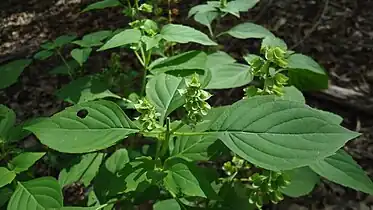Ocimum campechianum
Ocimum campechianum is a plant species in the family Lamiaceae, widespread across Mexico, Central America, South America, the West Indies, and Florida.[2]
| Ocimum campechianum | |
|---|---|
 | |
| Scientific classification | |
| Kingdom: | Plantae |
| Clade: | Tracheophytes |
| Clade: | Angiosperms |
| Clade: | Eudicots |
| Clade: | Asterids |
| Order: | Lamiales |
| Family: | Lamiaceae |
| Genus: | Ocimum |
| Species: | O. campechianum |
| Binomial name | |
| Ocimum campechianum | |
| Synonyms [1] | |
|
Ocimum micranthum Willd. | |
Leaves of Ocimum campechianum are eaten in Brazil's Amazon jungle. Similar to basil, it has a pungent flavor and contains essential oils which have been used ethnomedicinally. In Amazonia, the aromatic leaves are used as an admixture in ayahuasca brews. The plant is known as albahaca in Mexico and called xkakaltun in Mexico's Yucatan Peninsula, where it is considered a honey plant and is used as an abortifacient.[3] It is referred to in Brazil as alfavaca and has also been referred to as albahaca del monte,[4] Amazonian basil, wild sweet basil, wild mosquito plant, least basil, Peruvian basil, spice basil, alfavaca-do-campo, manjericao and estoraque.[5][6]
Essential oil
Essential oil from O. campechianum has been tested for its in vitro food-related biological activities and found comparable to the essential oils of common basil and thyme and superior in its capacity as an antioxidant. It has also been found to possess antifungal activity against food spoiling yeasts. The leaves have the highest concentration of essential oil (4.3%).[7][8] Multiple chemotypes exist within the species and can be distinguished by analyzing the essential oil by gas chromatography (GC) and/or GC isotope ratio mass spectrometry.[9]
References
- "Ocimum campechianum". Germplasm Resources Information Network. Agricultural Research Service, United States Department of Agriculture. Retrieved September 26, 2012.
- Kew World Checklist of Selected Plant Families
- Rätsch, Christian (2005). The Encyclopedia of Psychoactive Plants: Ethnopharmacology and its Applications. One Park Street, Rochester, Vermont 05767: Park Street Press. p. 573. ISBN 978-089281978-2.
{{cite book}}: CS1 maint: location (link) - "Albahaca". Plantas Que Curan (in Spanish). Retrieved 17 June 2014.
- "Epicurious – Recipes, Menu Ideas, Videos & Cooking Tips". 27 July 2023.
- "Amazonian Basil Uses, Benefits & Dosage - Drugs.com Herbal Database". Drugs.com. Retrieved 2022-09-17.
- Rosas, F. (2005). "Chemical composition of a methyl-(E)-cinnamateOcimum micranthum Willd. from the Amazon". Flavour and Fragrance Journal. 20 (2): 161–163. doi:10.1002/ffj.1374.
- Sacchetti, G.; Medici A; Maietti S; Radice M; Muzzoli M; Manfredini S; Braccioli E; Bruni R. (2004-06-02). "Composition and functional properties of the essential oil of amazonian basil, Ocimum micranthum Willd., Labiatae in comparison with commercial essential oils". J Agric Food Chem. 52. 52 (11): 3486–91. doi:10.1021/jf035145e. PMID 15161220.
- Wilson, Tyler M.; Murphy, Brett J.; Abad, Adrian; Packer, Chris; Poulson, Ariel; Carlson, Richard E. (2022). "Essential Oil Composition and Stable Isotope Profile of Cultivated Ocimum campechianum Mill. (Lamiaceae) from Peru". Molecules. 27 (9): 2777. doi:10.3390/molecules27092777. ISSN 1420-3049. PMC 9105928. PMID 35566129.